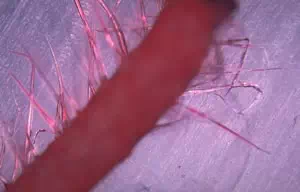|

Microorganisms
are subject to the same general requirements as chemical substances under
Toxic Chemical
Control
Act (TSCA). TSCA covers any new or existing commercial chemical substances,
mixtures, and articles unless they are specifically exempted by the Act.
Existing materials include more than 75,000 chemicals that are listed in
EPA’s TSCA Chemical Substance Inventory (TSCA Inventory). New materials
are added to the list as a result of "premanufacture notice" (PMN)
reporting, which is a requirement that must be met by manufacturers or
importers prior
to producing or importing a new chemical substance. For a new microorganism,
the required notice is called a Microbial Commercial Activity Notice (MCAN),
rather than a PMN. A "new" microorganism is defined as one "combining
genetic material from organisms in different genera." The notice must
contain the specific microorganism identity and the date when manufacture
or importation will commence. EPA has 90 days to review the MCAN (40
CFR 725.170). When the review is complete and importation actually
begins, a notice of commencement (NOC) of manufacture or import is required
(40
CFR 725.190). For detailed information go to Toxic
Chemical Control Act.
Exports
Export of a microorganism identified in subpart
M of 40 CFR 725 is subject to the notification provisions of 12(b)
of TSCA. EPA's TSCA Section 12(b) export notification requirements
apply to chemical substances or mixtures for which data are required
under TSCA Section 5(b), an order has been issued under TSCA Section
5, a proposed or final rule has been issued under TSCA Sections
5 or 6, or an action is pending or relief has been granted under TSCA
Sections 5 or 7. With regard to Section 4 of TSCA, only those chemical
substances or mixtures listed in final TSCA Section 4 test rules and
TSCA Section 4 Enforceable Consent Agreements (ECAs) are subject to the
export notice requirements under TSCA Section 12(b). Notification of
export is generally not required for articles, as provided by 40
CFR section 707.60(b).
Imports
Import of a microorganism identified in subpart
M of 40 CFR 725 is subject to the
notification provisions of section 13 of TSCA.
TSCA Section 13 requires that any chemical substance, mixture, or article
containing a chemical substance or mixture
be refused entry into the customs territory of the U.S. if it fails to comply
with any rule in effect under TSCA or is offered for entry in violation of
section 5, 6, or 7 of TSCA (Go to TSCA).
EPA’s Policy Statement, 40
CFR 707.20, requires
that importers "certify" their imported chemical substances or mixtures are
either: (1) in compliance with TSCA Sections 5, 6 and 7 at the time of import;
or (2) not subject to TSCA. The current TSCA Import Rule does not pertain
to importation of articles.
In addition, Section 13 provides that the Treasury Department (U.S. Customs),
in conjunction with EPA, implement these requirements. For that reason, Customs
can refuse entry of any shipment that does not have a TSCA certification.
An importer of record provides the certification by signing one of the following
statements to be typed, preprinted on the invoice, or otherwise included
in the entry documentation:
|
Item
|
Certification
Action
|
|
Article
|
No certification
required
|
|
Tobacco or tobacco
product
|
No certification
required
|
|
Pesticides (but
not pesticide intermediates), nuclear materials, food, food additives,
drugs, cosmetics, or medical devices.
|
Negative certification
generally required*
|
|
Chemical substances
or mixtures (other than articles) subject to TSCA
|
Positive certification
required**
|
*Negative Certification
Statement: "I certify
that all chemicals in this shipment are not subject to TSCA."
**Positive Certification
Statement: "I certify
that all chemical substances in this shipment comply with all applicable
rules or orders under TSCA and that I am not offering a chemical substance
for entry in violation of TSCA or any applicable rule or order under TSCA."
More Resources
40 CFR 725. Establishes all reporting requirements under section 5 of TSCA for manufacturers, importers, and processors of microorganisms subject to TSCA jurisdiction for commercial purposes, including research and development for commercial purposes.
|
